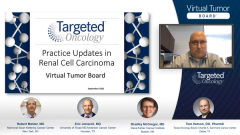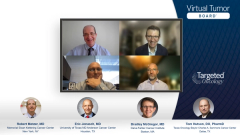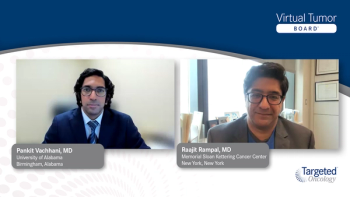
Case 3: mRCC Keynote-564 Study
Bradley McGregor, MD, reviews data from the Keynote-564 study on the use of immunotherapy in the adjuvant setting.
Episodes in this series

Robert Motzer, MD: There has been I think a high level of interest and excitement from many of us for I-O [immuno-oncology] therapy in the adjuvant setting. Most recently there was the KEYNOTE-564 study that read out as a positive study in this setting. Bradley, would you review those data for us and give us your take in terms of the outcome?
Bradley McGregor, MD:Yes. I think everyone at this point, we’ve been relatively disappointed with the activity of sunitinib, and that is seen here by the KEYNOTE-564, which is looking at the role of pembrolizumab plus nephrectomy. In this study, patients with locally high-risk renal cell carcinoma [RCC] who underwent nephrectomy 12 weeks prior to randomization, no prior systemic therapy, these patients had really high-risk disease. This is going to be T2, grade 4, or presence of sarcomatoid features, T3 or T4, any node positive, or M1 NED [no evidence of disease], but not just M1 NED. They had to have M1 NED within 12 months of initial nephrectomy.
A patient who has an isolated lung nodule 2 years later, we know those patients do well. These are really high-risk patients, and patients were randomized in a 1:1 fashion to pembrolizumab, 200 mg every 3 weeks for about a year, versus placebo. You notice they did not use sunitinib despite the FDA approval of sunitinib, just highlighting the role of sunitinib in this setting. The primary end point was PFS [progression-free survival] per investigator. The key secondary endpoint was overall survival, and the other secondary end point was safety. Patients were stratified by M0 versus M1 NED, as well as performance status, and enrollment site in the United States versus non-US.
Here again we see the key information. This is looking at disease-free survival [DFS], and we see a marked improvement in disease-free survival, a hazard ratio of 0.68, with a 95% confidence interval of 0.53 to 0.87. This corresponds to about a 10% improvement in disease-free survival at 2 years. Thus, placebo is about 68%, to over 78% with pembrolizumab.
In addition, while not shown here, they looked at this across subgroups, so they looked at the T3 versus the T4 versus different grades. Really, across subgroups there was a clear benefit. There didn’t seem to be one group that derived a benefit, PD-L1–negative versus PD-L1–high. The M1 NED was actually a relatively small percentage of the population.
While early, there was a nonstatistical hint that there may be a survival benefit, so...would certainly be intriguing. This is fantastic that there’s 10% improvement in DFS at 2 years. At what cost? Here we see the tornado plot looking at toxicity. Also, we can see that there were certain adverse effects with pembrolizumab and adverse effects with placebo as well.
I think the ones we look at specifically are going to be fatigue, hyperthyroidism was not uncommon. Diarrhea, rash were the things you see most likely. Of note, in general, when we looked at this overall, there was a decent percentage of patients who needed high-dose steroids, around 10% or so of patients needed high doses of steroids.
This is really focusing on those immune-related adverse events, which we certainly care about the most; again, hypothyroidism, hyperthyroidism, pneumonitis were the most common. But we see other things as well. We see some patients getting type 1 diabetes, and this is not insignificant numbers, 9 patients. This certainly has excellent activity, but there is some risk of toxicities overall.
Robert Motzer, MD: They are really exciting data and presented so well in the KEYNOTE-564 trial. In terms of the patient population for this study compared to the prior studies with sunitinib, was it a comparable patient population, or was this directed toward a different stage of RCC?
Bradley McGregor, MD:This is more in line with the S-TRAC trial criteria, looking at those higher risk patients. Some of the earlier trials, such as the ASSURE trial, included patients with T1b disease. These are definitely patients where we were more worried about recurrence, and I so I think they are certainly intriguing data. While we have very short follow-up and only investigator-assessed DFS, I think the magnitude of benefit at 2 years is encouraging. Also, mechanistically I think, as we’ve all said, we’re much more excited about the role of immune checkpoint blockade in the adjuvant setting, and harnessing that immune system, than we were about the role of VEGF/TKIs [tyrosine kinase inhibitors] in that setting.
Robert Motzer, MD: Do you think this is a treatment for all patients who have had resected RCC, or are there certain patient populations that you would say this is more of an appealing approach? Or how would you frame a discussion with a patient regarding who benefits from this sort of therapy?
Bradley McGregor, MD:Yes. I think that’s a great question. There didn’t seem to be any clear biomarkers that a certain patient really strongly benefits. We’ll wait to see what the FDA says. I would say, I would definitely follow the clinical trial. I would look at those patients with T2 grade 4 or higher. I do think that sarcomatoid features tend to be associated with response to immune checkpoint blockade, and we know those patients tend to have worse outcomes, aggressive disease. For someone who has like a T3 clear cell grade 4, sarcomatoid features, I would strongly think about adjuvant pembrolizumab in that situation. Because we’ve seen enough data across the different trials with I-O/I-O, VEGF/I-O, even just monotherapy with pembrolizumab in the single-arm phase 2 trial, that sarcomatoid does seem to be predictive of benefit to immune checkpoint blockade.
Robert Motzer, MD: The M1 group was fairly small. It was kind of a small slice with a big apparent benefit for adjuvant therapy. Do you see this as being a treatment program that would be adequate for M1 patients who have been rendered free of disease? Or do you feel we need more numbers in that patient population or follow-up?
Bradley McGregor, MD:That’s a great question. I think that we’ve seen data with TKI in the M1 NED with pazopanib and sorafenib, and we haven’t seen any benefit. I think that certainly these data look much more intriguing. To what we talked about earlier, the real question is, is there a benefit to ipilimumab up front, and if by doing monotherapy right away are you potentially missing that shot to get that benefit from ipilimumab? I think that remains to be seen. I think longer term follow-up is going to be really important as we move forward. But I think this certainly gives us an appealing option in that M1 NED, specifically concerning those patients who relapse quite quickly with oligometastatic disease.
Robert Motzer, MD: We’re waiting for additional information, follow-up on survival. Is that survival benefit necessary to apply this to patients or to consider patients? Or do you feel that the disease-free survival data are adequate to make this, in your opinion, appropriate for standard of care for patients with locally advanced RCC?
Bradley McGregor, MD:If you look at the FDA history overall, improvement in disease-free survival has been a marker that leads to FDA approval of drugs. You saw that just with nivolumab in...carcinoma. Sunitinib is approved based on a PFS benefit. I would imagine that this disease-free survival benefit will lead to an FDA approval, and I think it does offer itself as a standard of care, and it’s something that can be discussed with the patients, with the limitation of analysis of where we are right now. But I think they are certainly compelling data. I think what’s marked about this is, if we look at the quality of life data for a TKI, there are a lot of toxicities, a lot of patients had to stop for toxicity, quality of life.
Quality of life analysis with pembrolizumab was done and presented at ESMO [European Society for Medical Oncology annual meeting], with the limitations of the instrument used in the study of no disease, then non-VEGF therapy. There was no detriment in quality of life with pembrolizumab, which is certainly encouraging. I think it does give us an option to talk about with our patients, for those who really want to be aggressive and want to do everything they can to prevent their disease from relapsing.
Robert Motzer, MD: Thanks so much for that discussion and that overview of the data.
Transcript edited for clarity.







































